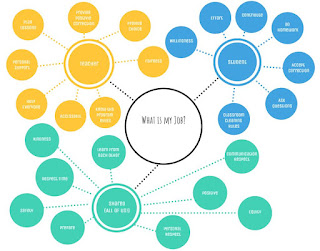TESL 0120: Unit 1 - How do I know how to Speak?
It is amazing to me that we generally speak with fluency and accuracy and we have little or no idea how we accomplish this.
This is my fourth module in the TESL program and each time I enroll, I am surprised by the lack of baseline knowledge that I seem to have in what are basic tenets of the English language. I can only say that I am thankful to be able to speak as well as I do (not that improvement wouldn't be useful)!
The first unit in this module has been a bit daunting as I try to assimilate what I know with the vocabulary and concepts that are being introduced. When I did the Reading and Vocabulary module, I felt that I could connect to the ideas and concepts more smoothly and found a place where I could contribute and develop. I feel a bit at a loss this week to understand how to construct the ideas that support the development of teaching skills in the areas of speaking and listening. I found the activity on "What Speakers Know" to be helpful and reinforcing for me. While I might not be familiar with the breadth of the content, many of the concepts were reinforcing my understanding with correct terminology and it was valuable for me to fill in the provided chart. Here are some of the ideas that support my own learning from this week:
References:
Thornbury, Scott (2005) How to Teach Speaking, Chapter 2: What Speakers Know
This is my fourth module in the TESL program and each time I enroll, I am surprised by the lack of baseline knowledge that I seem to have in what are basic tenets of the English language. I can only say that I am thankful to be able to speak as well as I do (not that improvement wouldn't be useful)!
The first unit in this module has been a bit daunting as I try to assimilate what I know with the vocabulary and concepts that are being introduced. When I did the Reading and Vocabulary module, I felt that I could connect to the ideas and concepts more smoothly and found a place where I could contribute and develop. I feel a bit at a loss this week to understand how to construct the ideas that support the development of teaching skills in the areas of speaking and listening. I found the activity on "What Speakers Know" to be helpful and reinforcing for me. While I might not be familiar with the breadth of the content, many of the concepts were reinforcing my understanding with correct terminology and it was valuable for me to fill in the provided chart. Here are some of the ideas that support my own learning from this week:
Socio-cultural Knowledge – knowing and understanding the “rules”
|
·
Knowledge about social values
·
Behaviour norms in a given society
·
Cultural greetings/requests/apologies
·
How to say “yes” and “no”
·
Body language
·
How we shake hands, embrace, salute, bow
|
Genre Knowledge – what type of speech event?
|
·
2 main purposes – transactional and
interpersonal
·
Transactional – convey facts – service encounters,
getting info, requesting service
·
Interpersonal – community – asking about the weather,
how is the family, etc
·
Interactive or non-interactive
·
Planned or unplanned
|
Discourse Knowledge
|
·
Turn taking in interactive talk
·
Use of discourse markers in speech – signal the
intent to continue and mark boundaries
eg. “well” “but” “right” “now” “anyway”
|
Pragmatic Knowledge – functions of speech acts
|
·
How we do... Politeness, compliments, suggestions,
requesting, offering - is pragmatic knowledge
·
Relation between language and context for use
·
Includes the purpose for why it’s being used
·
Adjusting message to context
·
Using contextual info to make sense of message
|
Grammar
|
·
Spoken grammar uses more personal pronouns
than written language
·
Direct vs indirect speech
·
Vague language
|
Vocabulary – spoken
|
·
Spoken requires less vocabulary than written
·
Express stance (speaker attitude); appraisal
(like or don’t like)
·
Chunking of ideas – helps fluency
·
Idiomaticity – doing what other speakers do
|
Phonology – pronunciation
|
·
Intonation
·
Paratone – indicates a new “paragraph” verbally
(rise in pitch)
|
Speech Conditions
|
·
Cognitive – familiar w/topic/genre/people you’ll
be talking to; processing demands
·
Affective – feelings about participants in
conversation and topics involved
·
Performance – mode, degree of collaboration,
discourse control, planning and rehearsal, time pressures or constraints,
speech in the environment (is there background noise, etc)
|
References:
Thornbury, Scott (2005) How to Teach Speaking, Chapter 2: What Speakers Know

Comments
Post a Comment